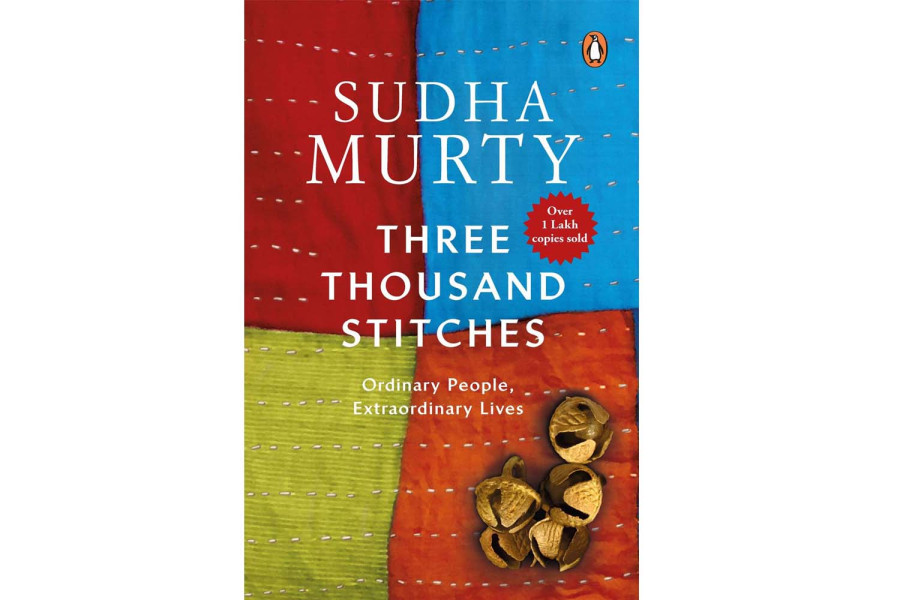Books
Tales of quiet grace in a noisy world
In ‘Three Thousand Stitches’, Sudha Murty turns everyday moments into powerful stories that speak to the heart.
Skanda Swar
With the increasing digital distractions and shallow connectivity, Sudha Murty’s ‘Three Thousand Stitches: Ordinary People, Extraordinary Lives’ is a stark reminder of the untold stories that drown in everyday lives.
Published in 2017, this collection of real-life accounts portrays how one of India’s most respected social workers and writers can turn mundane encounters into gripping tales of universal human experiences.
Murty, who has spent decades serving as chairperson of the Infosys Foundation, brings a unique perspective to storytelling that combines analytical precision with empathy. She finds meaning in the most unexpected places, weaving together twenty-one stories to form a rich tapestry of human experience.
What makes ‘Three Thousand Stitches’ stand out from other memoirs is that Murty presents personal stories as part of larger themes.
Each story is like a piece of embroidery, carefully thought out and designed. Individual narratives of human experience combine to create something that is both more beautiful and meaningful than what is conveyed by each separate issue.
The collection spans an impressive range of human experiences, moving seamlessly from encounters with domestic workers and street children to interactions with accomplished professionals and elderly individuals navigating life’s final chapters. What makes these narratives powerful is Murty’s restraint as a narrator; she consistently steps back to allow her subjects to emerge as fully realised individuals rather than mere illustrations of broader social points.
What stands out the most in this collection is the unshakeable commitment to treating each individual with dignity and respect. The author presents her subjects’ stories as those of complex human beings who possess their wisdom, challenges, and successes.
In pieces like ‘The Unsung Hero’, we are introduced to individuals who, although they may go under the radar regarding their social contributions, are very much at the heart of other people’s lives, which proves to be of great value.
The author also excels in her treatment of class and social hierarchy. Rather than providing simple answers to large-scale social problems, she presents issues that, in turn, challenge readers to examine their own preconceptions and blind spots. Her portrayals of domestic workers, for instance, reveal the intelligence, creativity, and emotional complexity of individuals who remain largely invisible to those they serve daily.
While deeply rooted in Indian society and customs, they also possess a significant universal appeal that transcends geography and culture. Murty’s in-depth exploration of family dynamics, workplace hierarchies, and community relationships is authentic and lived.
This cultural specificity does not limit the stories’ reach to a larger audience; rather, it enhances it. Readers can observe unique Indian social customs and family structures in action while simultaneously recognising the fundamental human emotions that unite us all. This fine balance between the specific and the universal is one of Murty’s greatest storytelling skills.
Murty’s prose is deceptive and straightforward; what you get are clear and direct sentences that present complex emotions and situations. This apparent simplicity heightens the emotional impact of her stories.
The author uses a first-person point of view, which produces an immediate sense of truth that draws the reader into each story from the start. Additionally, she has a knack for understanding what people say and how they speak, which lends a genuine atmosphere to every setting.
One of the best things about the collection is how Murti put forth social issues without coming off as didactic or heavy-handed. She brings up issues of poverty, inequality, gender discrimination, and social injustice through the lives of real people instead of via abstract arguments or large-scale statistics.
Murty’s perspective on social change is practical and humble. She does not present herself as a saviour or a revolutionary, which makes her reports more powerful, and her implicit pleas for greater compassion and understanding are far more convincing than any direct call to action could be.
The great measure of any story collection is how it leaves readers once they put the book down. ‘Three Thousand Stitches’ does this to a great degree. The individual stories have a growing emotional power that builds throughout the collection, which gives a deep picture of human experience and challenges readers to look at the world with more empathy and awareness.
Standout pieces like ‘The Wise Beggar’ and ‘A Saree for Amma’ present Murty’s skill at finding truths in the unexpected. Some of the more difficult stories, such as ‘The Mother Who Sold Her Children,’ approach tough issues with great sensitivity and grace. Each story adds to the whole picture of what it is like to live in a complex, often unfair world while at the same time holding onto your humanity and dignity.
Ultimately, ‘Three Thousand Stitches’ powerfully presents the importance of careful observation combined with sympathetic storytelling. Murty has created an entertaining and enlightening world, giving readers great stories that are a pleasure to read.
This collection is also important because it reminds us that great stories are right before us if we have the insight to see them and the talent to articulate what we observe. In today’s increasing social division and widespread misunderstanding, Murty’s focus on our shared humanity is urgently required and hopeful.
‘Three Thousand Stitches’ transcends the boundaries of typical memoir collections or social commentary. It represents an invitation to see the world more compassionately and recognise the inherent dignity and worth of every individual we encounter daily. For readers seeking literature that combines masterful storytelling with meaningful social insight, this collection is a rewarding experience.
‘Three Thousand Stitches: Ordinary People, Extraordinary Lives’
Author: Sudha Murty
Publisher: India Penguin
Year: 2017
Pages: 256




 13.54°C Kathmandu
13.54°C Kathmandu










